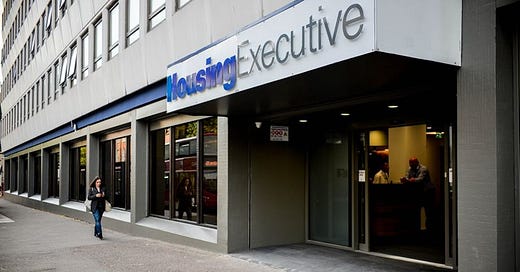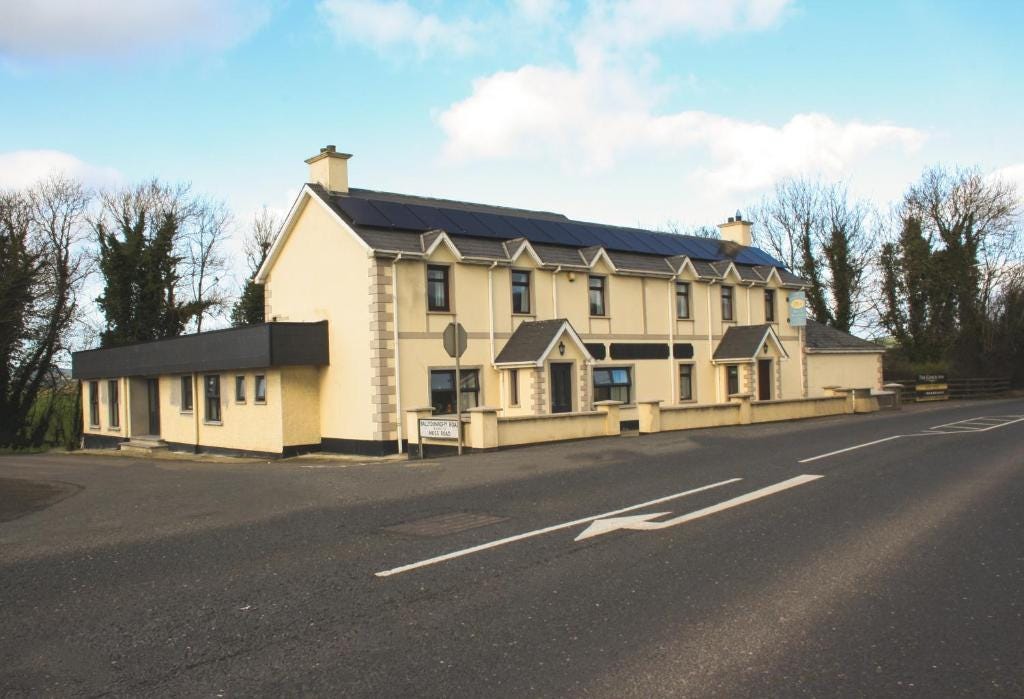Stormont pays landlords up to £1,600 rent to run bail housing beside schools
Stormont is building less social houses, yet paying off more landlords' mortgages while communities become miserable
This article is the second of two parts, looking at how temporary accommodation for those on bail, funded by the Housing Executive, is affecting people’s safety, while landlords and B&B owners profit. Part 1 came out on Wednesday 16th October.
Stormont is funding up to £1,600 in monthly rent to landlords for temporary housing, including for those on bail and ex-criminals, beside schools.
The Housing Executive, funded by the Department for Communities, is paying £28 million a year for this. Yet it is cutting the budget for building social housing.
One B&B, the Coach Inn on Victoria Road, Strabane, was only stopped from taking new temporary housing tenants last week.
It is 0.3 miles from a primary school, and 200 metres from a church whose attendance includes the elderly.
The policy has come into focus after the death of Kyle McDermott in Ballymagorry, and previously amid anti-social behaviour problems in places like Newtownstewart.
‘Bail hostels’
Steve Bradley, a regeneration consultant from Derry, has previously written about so-called ‘bail hostels’ in the city.
In a Derry News guest column a year ago, he paints a prescient picture.
Bradley spoke of a new wave of ‘guest houses’ in Derry in recent years. No license or special planning permission is needed to run a guest house, and there is no restriction on their location or numbers - in contrast with student accommodation and houses of multiple occupation (HMOs).
While HMOs must have a plan for tackling anti-social behaviour, and their license can be revoked if they don’t tackle problems, guest houses aren’t required to do this.
Bradley noted the Housing Executive was pumping money into the private sector for temporary accommodation, and that 41% of the north’s budget for this kind of housing was being spent in Derry - cheap house prices made it attractive to those buying up property for temporary accommodation.
Bradley’s remedy was to give ‘bail hostels’ their own planning classification, create a licensing scheme for these in the north as with HMOs, and limit the number of bail hostels in each town and city.
The surge in temporary accommodation numbers was also highlighted in Housing Today, an online trade magazine.
The magazine said, in 2022/23, the Housing Executive spent £28 million on temporary accommodation - up 543% since 2016/17. This included £7.6 million in hotels, B&Bs and similar, and £15.4m in temporary single-let housing (i.e. not HMOs).
The Chartered Housing Institute blamed cuts, which meant fewer social houses being built. This year, the Department for Communities’ capital budget (including house-building) was cut by 38%.
This is the gradual privatisation of temporary and emergency accommodation. Money that once went to build social houses in public ownership is now going to private landlords and B&B owners - who can then buy up more property for temporary housing and rake in an even bigger payday.
The Housing Executive said, at any one time, 400 households are in temporary accommodation in hotels and B&Bs.
With a £7.6 million annual spend by the Housing Executive on hotels and B&Bs, that is £19,000 per year - or around £1,600 per month - for each household.
If private renters in the north are competing with bail hostel tenants, it’s no wonder rent is on the rise.
Taxpayers funding landlords’ mortgages
Steve Bradley says hotel and B&B owners get a flat rate for temporary housing, wherever they are in the north.
In August 2024, the Derry Journal reported the average house price in Derry and Strabane to be £187,000.
If you got a mortgage on a property and made it a bail hostel, then at £1,600 a month, you’d pay it off in under 10 years. And you’d get to keep the equity, at taxpayer expense.
Members of the public at the meeting characterised Kathleen Caldwell as driven by profit and self-interest. One said many guest houses had “been run as halfway houses for financial gain for years”.
On Booking.com, Caldwell describes the Coach Inn as having “six bedrooms”.
The property was on sale in May 2018 for £179,000. If its value tracked house prices in Derry and Strabane, it might go for £282,000 today, and when Caldwell first operated it as a B&B in 2021, it might have been worth £203,000.
If six single people are each a ‘household’, that would mean up to £9,600 in rent per month - and £115,200 a year.
Even if we assume a per-head rate of rent, rather than per-household, and assume that a household is 2.5 people on average, this still means £3,840 a month in total rent, adding up to £46,080 a year for Caldwell.
If Caldwell had a mortgage on the Coach Inn, she was potentially set to pay it off in 5 years.
Consequences for renters and buyers
This has consequences for everyone who wants to buy or rent a house.
The more properties bought up by landlords, the less people who will own their own home, and the more who will be at the whims of a rent market to avoid becoming unhoused.
Being unhoused intersects with other social problems like mental ill health, addiction and alcoholism, all ultimately fuelling crime rates.
Those who could be pushed into becoming unhoused by the Stormont/Housing Executive plan to expand private housing, may themselves end up in temporary accommodation. A system that disempowers people, then forces them to depend on it.
What’s worse is that those benefiting won’t give up lucrative profits quietly. Stormont and the Housing Executive have grown a powerful lobby of landlords and B&B owners, raking in £28 million a year and counting.
Amid this, the Housing Executive has given little transparency over who was being housed where, to whose benefit - a point raised repeatedly last Friday.
They don’t tell residents who is being housed near them - and that is convenient for those profiting, who have an incentive to pressure the Housing Executive to keep it that way.
This lobby is intermingled with a wider landlord and private accommodation sector. In 2022, 13 of Stormont’s 90 MLAs declared they were landlords - including West Tyrone Sinn Féin MLA Declan McAleer, and the SDLP’s Colin McGrath, an MLA colleague of Daniel McCrossan.
Analysis: What is the solution?
While Steve Bradley’s aforementioned proposals might be a good place to start, there are a few other things to consider also.
Public money for public housing
When taxpayer money builds social housing, that money isn’t lost - it’s simply transferred into an asset owned by the taxpayer. In the case of social houses, the asset generates rent (priced affordably).
But when taxpayer money pays off a mortgage for a landlord or a B&B owner, that is a transfer of wealth, from the taxpayer to private hands.
And with a transfer of wealth comes a transfer of power.
Cuts to the budget for building social housing, like so many other cuts, have created a false economy.
The taxpayer has ‘saved’ money on building social housing, but it is now out more money paying landlords for temporary housing, without any assets to show for it.
This is a rip-off for the taxpayer, a rip-off for renters who face rising prices as a result, and a rip-off for first-time buyers who want a house to live in, not to let.
This false economy must end. Public money should fund public housing, owned by the public and for the benefit of the public.
Specialised, dedicated, purpose-built housing
Landlords are buying up ordinary houses built as family homes and using them to house people on the Housing Executive’s temporary/emergency accommodation list.
This will not suit everyone. Different people have different needs.
You don’t need to be an expert to see that living in a B&B and being able to freely roam the streets, despite having a record of violent crime and reoffending, and suffering from addiction and other mental health issues, while having inadequate support for these struggles, is not a good idea.
One option is housing integrated with facilities that are equipped to deal with complex needs, including for ex-criminals, those on bail, addiction sufferers, those with mental health conditions, those with behavioural problems, or some particular combination of these.
Whatever the particular design or specifics, you can’t have schemes like this if the people that would benefit are scattered across many different individual lets.
Tackle the root causes of crime and anti-social behaviour
If the policy focus is on where people are located and how they are distributed geographically and whether many are concentrated in certain places, all we will end up doing is moving people around.
In some cases, location does matter, but it’s not the entire story.
The root causes of crime are social factors. Things like being unhoused, mental health conditions (including addiction, and within that including alcoholism), and financial hardship and precarity are all risk factors.
There is no practical substitute for a strong welfare state, which upholds a social security net and tackles these root causes.
It’s not just cuts to the social housing budget, and an ensuing transfer of wealth to landlords, that can be described as a false economy.
It’s the politics of austerity in general, which we are now so many years and so far deep into, that it has become the norm.
The Westminster media and political bubble does not speak of “austerity” any more, because it is so ubiquitous, widespread, inescapable, as to go without saying.
When addiction services, mental health services, welfare payments, and more are cut, it might save the public purse some money on the surface, in the immediate term.
But take a look around at the society we live in right now, what we hear on the news, what we see on our streets. The lives of those with us. And those who aren’t.
For austerity saves little, and costs much.







